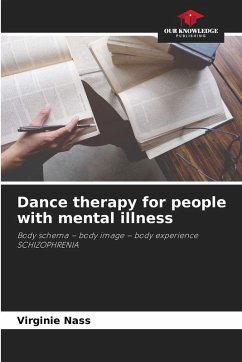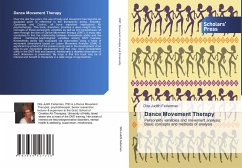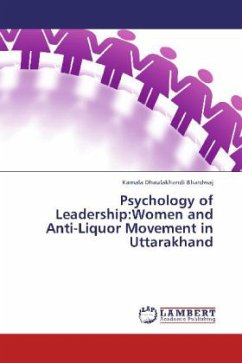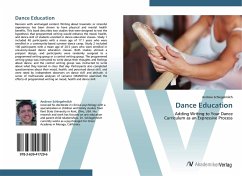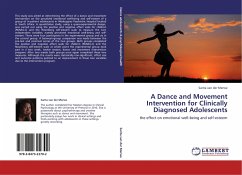
A Dance and Movement Intervention for Clinically Diagnosed Adolescents
the effect on emotional well-being and self-esteem
Versandkostenfrei!
Versandfertig in 6-10 Tagen
39,99 €
inkl. MwSt.

PAYBACK Punkte
20 °P sammeln!
This study was aimed at determining the effect of a dance and movement intervention on the perceived emotional well-being and self-esteem of a group of in-patient adolescents in Weskoppies Psychiatric Hospital located in South Africa. A quantitative study, using a quasi-experimental design, was carried out using the positive and negative affect scale for children (PANAS-C) and the Rosenberg self-esteem scale to measure the two independent variables, namely perceived emotional well-being and self-esteem. There were four participants in the experimental group and six in the control group. A betw...
This study was aimed at determining the effect of a dance and movement intervention on the perceived emotional well-being and self-esteem of a group of in-patient adolescents in Weskoppies Psychiatric Hospital located in South Africa. A quantitative study, using a quasi-experimental design, was carried out using the positive and negative affect scale for children (PANAS-C) and the Rosenberg self-esteem scale to measure the two independent variables, namely perceived emotional well-being and self-esteem. There were four participants in the experimental group and six in the control group. A between-group comparison was made between the pre-test and post-test scores of the two groups. Both groups completed the positive and negative affect scale for children (PANAS-C) and the Rosenberg self-esteem scale at which point the experimental group took part in a two week, twelve session, dance and movement intervention program. After two weeks both groups once again completed these two measures. Although the results were statistically non-significant, effect size and outcome patterns pointed to an improvement in these two variables due to the intervention program.



